1. FC Union Berlin
1. Fußballclub Union Berlin e. V., commonly known as 1. FC Union Berlin (German pronunciation: [ˈʔeːɐ̯.tɐ ʔɛf tseː ʊnˈɪ̯oːn bɛɐ̯ˈliːn]), is a professional German association football club based in Köpenick, Berlin. The club emerged under the current name in 1966 but its origins can be traced back to 1906, when its predecessor FC Olympia Oberschöneweide was founded. From 2009 until 2019, they competed in the 2. Bundesliga, the second tier of German football. In 2019, after defeating VfB Stuttgart in the relegation play-offs, Union won promotion to the Bundesliga top flight for the first time in the club's history, for the 2019–20 season.
 | ||||
| Full name | 1. Fußballclub Union Berlin e. V. | |||
|---|---|---|---|---|
| Nickname(s) | Die Eisernen (The Iron Ones) | |||
| Founded | 20 January 1966 (Preceded by FC Olympia Oberschöneweide, founded in 1906) | |||
| Ground | Stadion An der Alten Försterei | |||
| Capacity | 22,012 | |||
| Chairman | Dirk Zingler | |||
| Manager | Urs Fischer | |||
| League | Bundesliga | |||
| 2019–20 | Bundesliga, 11th of 18 | |||
| Website | Club website | |||
|
| ||||
During the Cold War era, Union was based in the East Berlin sector of the city, joining the common German league structure upon the reunification of the city and the country in 1990.[1]
The home ground Stadion An der Alten Försterei (Stadium by the Old Forester's House) is the largest single-purpose football stadium in the German capital. It has been home to Union Berlin and its forerunners since it was opened in 1920.[2] The stadium became internationally famous for concerts and events like the annual Weihnachtssingen (Christmas Carols Event) and the WM-Wohnzimmer (World Cup Living Room) in 2014.[3]
The club has become well known for its enthusiastic and creative fan base and for its chant "Eisern Union" (Iron Union).[4]
History
First foundation (1906–1945)
The name 1. FC Union Berlin was used by two football clubs that shared a common origin as FC Olympia Oberschöneweide, founded in 1906 in Oberschöneweide, which by that time was a suburb of Berlin. The side took on the name SC Union 06 Oberschöneweide in 1910. Union was one of Berlin's premier clubs in the interwar period, regularly winning local championships and competing at the national level, including an appearance in the 1923 German championship final which they lost 0–3 to Hamburger SV.
Early on, the team was nicknamed "Schlosserjungs" (English: metalworker-boys) because of their then all blue kit, reminiscent of the typical work clothing worn in the factories of the industrial Oberschöneweide district. The popular cry of Union-supporters – "Eisern Union!" (Iron Union) – also emerged at this time.[5] Since its foundation the club has had a distinct working-class image, in contrast to other local clubs with more middle-class origins, such as Viktoria 89 Berlin, Blau-Weiß 90 Berlin, BSV 92 Berlin or Tennis Borussia Berlin.
In 1933, German football was reorganized under the Third Reich into 16 top flight divisions known as Gauligen. Oberschöneweide' became part of the Gauliga Berlin-Brandenburg where they generally earned middling, unexceptional results. They were relegated in 1935 and returned to first division play in 1936 after only one season's absence. In 1940, the team finished first in Group B of the division and then defeated Blau-Weiss (1–2, 3–0) to win the overall division title. That advanced the club to the national playoffs where they were put out by Rapid Wien in the opening group round (2–3, 1–3). Union resumed its place as an unremarkable side. They were relegated again in 1942 and played the final war-shortened Gauliga season in 1944–45.
Dissolution and split up (1945–1961)
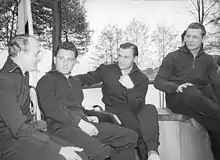
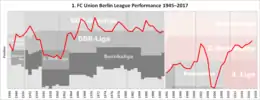
After World War II, occupying Allied authorities ordered the dissolution of all organizations in Germany, including sports and football associations. A new sport community called SG Oberschöneweide was formed in late 1945 and it played in the City League organized immediately after the war which had four regional departments. The team did not qualify to the newly created Oberliga Berlin (I) in 1946 after a poor season, but was promoted in 1947, won the division title right away and regained club status as SG Union Oberschöneweide during 1948–49.
The club finished the 1949–50 season in second place in Berlin and qualified to take part in the national final rounds. However, escalating Cold War tensions led Soviet authorities to refuse the team permission to travel to take part. Two Union teams then emerged as most players and coaches fled to the west to form Sport-Club Union 06 Berlin which took part in the scheduled playoff match in Kiel against Hamburger SV, losing 0–7.[6][7]
The players remaining in the east carried on as SG Union Oberschöneweide while a number of players who had fled to the west to form SC organized a third side called Berliner Ballspiel-Club Südost. The western team was a strong side until the construction of the Berlin Wall in 1961, drawing huge crowds to matches in the Olympiastadion.[5] The division of the city led to a change of fortunes for the club which plays today in the lower divisions before meagre crowds.
Restart as Union Berlin (1961–1990)

The eastern branch of the club went through a number of name changes: Union Oberschöneweide (1950), BSG Motor Oberschöneweide (1951), SC Motor Berlin (1955), TSC Oberschöneweide (1957), TSC Berlin (1963) – finally becoming the football club 1. FC Union Berlin in 1966. The club was sponsored by the large state-owned combine VEB Kabelwerk Oberspree (KWO) and the state-owned companies VEB Transformatorenwerk Oberschöneweide (TRO) and VEB Werk für Fernsehelektronik (WF).[8][9][10] It was initially also supported by the state-controlled national trade union FDGB.[8]
1. FC Union Berlin developed a bitter rivalry with BFC Dynamo, which was supported by the Stasi.[5] While their arch rivals won 10 titles in a row, Union yo-yoed between the DDR-Oberliga and the DDR-Liga with very little success. Union managed to win the East German Cup in 1968 when they defeated FC Carl Zeiss Jena 2–1 although they lost in their second cup appearance in 1986 to 1. FC Lokomotive Leipzig by a score of 1–5.
The East German state-owned film studio DEFA produced a documentary about the supporters of 1. FC Union Berlin in 1989. The documentary is called "And on Friday’s we go to 'Green Hell'" and follows a group of supporters of 1. FC Union Berlin to both home and away matches during the 1987-88 season.[5]
2. Bundesliga era (1990–2019)
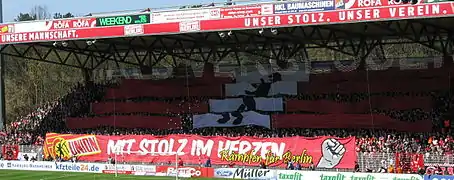
After German reunification in 1990, the team continued to perform well on the field, but almost collapsed financially. They managed to hang on through some tight times and find sponsorship, but only after winning their division in both 1993 and 1994 and each time being denied a license to play in the 2. Bundesliga due to their financial problems. The club had another close brush with financial failure in 1997.[5]
Union again came close to advancing to 2. Bundesliga in 1998–99 and 1999–2000, but were disappointed. They were finally successful in 2000–01, under Bulgarian manager Georgi Vasilev, easily winning the Regionalliga Nord (III) and moving up a division to become the city's second most popular side. That same year they appeared in the final of the German Cup where they lost 0–2 to FC Schalke 04, and advanced as far as the second round in UEFA Cup before being put out by Bulgarian side PFC Litex Lovech. The club slipped to the Regionalliga Nord (III) in 2004–05 and then to the NOFV-Oberliga Nord (IV) in 2005–06, but returned to third division play after capturing the Oberliga title. In 2008–09, Union became one of the founding clubs of the new 3. Liga, and its inaugural champion, securing first place and promotion to the 2. Bundesliga on 10 May. They remained in the 2nd-tier until the 2018–19 season, when they secured their first ever promotion into the Bundesliga after defeating VfB Stuttgart in the play-offs. The fans invaded the pitch, but no one was harmed.[11]
Bundesliga era (2019–present)
Union Berlin became the first Bundesliga club from the former East Berlin and the fifth from the former East Germany, after Dynamo Dresden, Hansa Rostock, VfB Leipzig and Energie Cottbus. The team is the sixth to win promotion from the 2. Bundesliga by beating the 16th-placed Bundesliga team in the playoff – since it began in the 1981–82 season, the others being Bayer Uerdingen, 1. FC Saarbrücken, Stuttgarter Kickers, 1. FC Nürnberg and Fortuna Düsseldorf. Ahead of Union Berlin's debut season in the Bundesliga, the club signed Neven Subotić,[12] Anthony Ujah[13] and Christian Gentner,[14] as well as re-signing Marvin Friedrich, who had scored a decisive goal against Stuttgart in the play-offs in the previous season to secure promotion for the club.[15] The first ever Bundesliga goal was scored by Sebastian Andersson in a 1–1 draw against Augsburg.[16] On 31 August 2019, the club claimed its first ever Bundesliga victory by beating Borussia Dortmund 3–1 in a home game.[17] The team finished the season in 11th place, with Sebastian Andersson scoring 12 goals.
Stadium
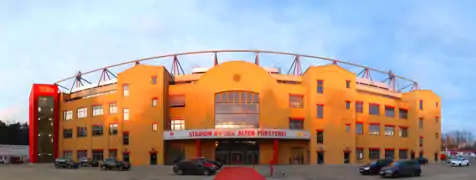
In 1920 SC Union Oberschöneweide (forerunner of today's 1. FC Union Berlin) had to find a new home ground as its former pitch had been built over by developers with residential buildings. The club moved a little further away from the city to the north-western part of the borough of Köpenick. The new stadium was officially opened in August 1920 with a match between Oberschöneweide and the then German champions 1. FC Nürnberg (1–2). The inaugural match in at the Alte Försterei had already been played on 17 March, when Union challenged Viktoria 89 Berlin.
When Union won promotion to the DDR-Oberliga (the top flight in East Germany) in 1966, the stadium soon needed to be expanded. The ground was first expanded in 1970 when the Gegengerade terrace was raised, whilst further extensions to the terracing at both ends in the late 1970s and early 1980s increased the capacity furthermore to 22,500. However, the somewhat spartan facilities at Alte Försterei had quickly begun to show their age and went into a serious decline.
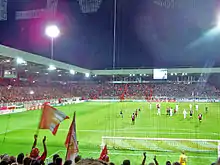
After German reunification, when Union were assigned by the German Football Association to play in the third league, the outdated stadium proved only one of a number of factors that hampered the club's push for promotion to higher leagues.
In the middle of 2008, the club decided to finally modernise the stadium, the Stadion An der Alten Försterei (Old Forester's House). Money was still tight, and so the fans simply built the ground themselves. More than 2,000 Union supporters invested 140,000 working hours to create what is now regarded as the largest football-specific stadium in Berlin.[18] During the redevelopment, Union played at the Friedrich-Ludwig-Jahn-Sportpark. Inside the stadium an array of outside beer kiosks and open air grills serving bratwurst and pork steaks at the back of the stand provide the culinary staples. The official opening on 12 July 2013, was celebrated with a friendly against Scottish Champions Celtic. It holds 22,012 people with 3,617 seats. The rest is terracing.
World Cup living room
In 2014, the club came up with the idea of inviting their fans to take their own sofas to the ground for the whole of the World Cup, in order to enjoy the televised matches in the company of fellow supporters.[19] More than 800 sofas were placed on the pitch in rows in front of a big screen.[20] The event was later recognized with the Fan Experience Award at The Stadium Business Summit 2015 in Barcelona.[21]
Players
Current squad
- As of 5 February 2021[22]
Note: Flags indicate national team as defined under FIFA eligibility rules. Players may hold more than one non-FIFA nationality.
|
|
Out on loan
Note: Flags indicate national team as defined under FIFA eligibility rules. Players may hold more than one non-FIFA nationality.
|
|
Notable former players

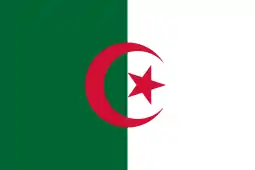 Karim Benyamina
Karim Benyamina Daniel Teixeira
Daniel Teixeira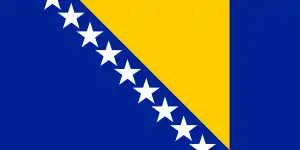 Sergej Barbarez
Sergej Barbarez Jörg Heinrich
Jörg Heinrich Robert Huth
Robert Huth Marko Rehmer
Marko Rehmer Patrick Kohlmann
Patrick Kohlmann Bobby Wood
Bobby Wood
All time top scorer
![]() Karim Benyamina (87)[23]
Karim Benyamina (87)[23]
The number 22 won’t be worn on the back of an Union shirt for the foreseeable future — until someone manages to break the all-time Union scoring record of Karim Benyamina who scored 87 goals in 213 appearances for the club. “This is a great gesture by president Dirk Zingler. That is the reward for six successful years,” he said in 2016. Over 14,000 fans turned out to give Benyamina his career send-off alongside another legend, Torsten Mattuschka, who is often seen as the face of that particular era for Union[23]
Reserve team
The club's reserve team, 1. FC Union Berlin II, most recently played in the tier four Regionalliga Nordost, having won promotion to the league in 2012. Previous to this it spent two seasons in the NOFV-Oberliga Nord. At the end of the 2014–15 season the club withdrew the team from competition.[24][25]
Women
Union Berlin's women's team was formed in September 1969, becoming the first women's team in Berlin and one of the first in East Germany. The women's team initially competed against Union Berlin's youth teams due to a lack of opponents, playing their first game on 17 January 1970, losing 7–1. In 1971, the team were amalgamated into KWO Berlin's women's team, before KWO merged with Union Berlin in June 1990 following German reunification.[26] The team currently compete in the Regionalliga Nordost.
Coaches
| List of Union Berlin Managers since 1965 | ||||||||||||||||||||||||||||||||||||||||||||||||||||||||||||||||||||||||||||||||||||||||||||||||||||||||||||||||||||||||
|---|---|---|---|---|---|---|---|---|---|---|---|---|---|---|---|---|---|---|---|---|---|---|---|---|---|---|---|---|---|---|---|---|---|---|---|---|---|---|---|---|---|---|---|---|---|---|---|---|---|---|---|---|---|---|---|---|---|---|---|---|---|---|---|---|---|---|---|---|---|---|---|---|---|---|---|---|---|---|---|---|---|---|---|---|---|---|---|---|---|---|---|---|---|---|---|---|---|---|---|---|---|---|---|---|---|---|---|---|---|---|---|---|---|---|---|---|---|---|---|---|
.jpg.webp) Uwe Neuhaus was the longest serving manager of 1. FC Union Berlin
| ||||||||||||||||||||||||||||||||||||||||||||||||||||||||||||||||||||||||||||||||||||||||||||||||||||||||||||||||||||||||
European record
Overview
| Competition | S | P | W | D | L | GF | GA | GD |
|---|---|---|---|---|---|---|---|---|
| UEFA Europa League/UEFA Cup | 1 | 4 | 1 | 2 | 1 | 4 | 3 | +1 |
| Total | 1 | 4 | 1 | 2 | 1 | 4 | 3 | +1 |
Club culture
1. FC Union Berlin is recognized as one of Europe's "cult" clubs, based on many unique fan and club initiatives over the last two decades.[27][28][29]
The nicknames of the club are Eiserne (the Iron Ones) or Eisern Union (Iron Union). These nicknames evolved from the earlier sobriquet Schlosserjungs (metalworker boys), a reference to the blue kit the Union played in, as it was reminiscent of the overalls worn by local workers.[30]
In May 2004, the supporters raised enough money to secure the club's license for fourth-division football through a campaign called 'Bleed for Union'.[31] This catchphrase was not meant metaphorically. One element of the campaign was that fans donated blood to Berlin hospitals and then gave the money they received from the blood bank to their club.
After 2010, Union Berlin became increasingly attractive for new Berliners, even internationals, who were drawn to the atmosphere at the club.[32]
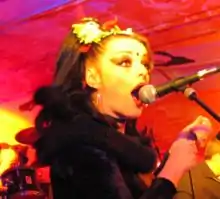 Punk legend Nina Hagen
Punk legend Nina Hagen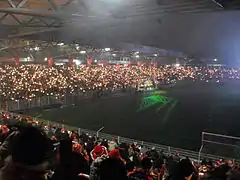 Weihnachtssingen (Christmas carols singing) in 2010
Weihnachtssingen (Christmas carols singing) in 2010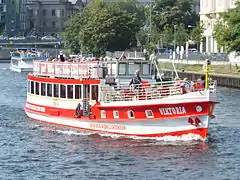 Union Berlin boat on the river Spree
Union Berlin boat on the river Spree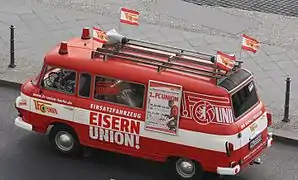 Union Berlin Bus
Union Berlin Bus
Rivalries
In former GDR times, Union was known for a rivalry with BFC Dynamo which was reputedly affiliated with East Germany's Secret Service (Stasi). Union was patronized by Eastern German Trade Union FDGB. The club played some identificatory role in the unofficial opposition against the authorities of the communist system.[33] Between 1979 and 1988, BFC Dynamo won ten consecutive East German league titles, with popular allegations of sporting misconduct helping to fuel the rivalry, and clashes between both sets of fans occurred.[34] It is said that fans of Union often chanted "The wall must go!", with a reference to the Berlin Wall, when the opponents formed a wall during free kicks in 1980s. However, some sources suggest that this is partly a myth and exaggerated.[35][36][37]
Despite Union Berlin and Hertha BSC making up Berlin's two biggest clubs, a rivalry between the two is much less pronounced. On 27 January 1990, 79 days after the fall of the Berlin Wall, Hertha hosted Union Berlin at the Olympiastadion in a friendly in front of 52,000 spectators. Fans of both club's paid for admission in East and West Germany's respective currencies and sang songs of German reunification as Hertha won 2–1. Over twenty years later, on 17 September 2010, the duo faced each other for a second time, in their first competitive meeting, at the Stadion An der Alten Försterei, drawing 1–1 in the 2. Bundesliga.[38] On 2 November 2019, Union Berlin faced Hertha at the Stadion An der Alten Försterei, in the first clash between the clubs in the top flight of German football. An 87th minute Sebastian Polter penalty secured a 1–0 win for Union, in a game temporarily suspended by referee Deniz Aytekin, following fireworks fired by Hertha fans landing amongst Union Berlin fans, as well as on the playing surface. 1,100 police officers were on duty for the game, with Hertha fans burning Union Berlin shirts, flags and scarves during the game. Following full time, Union Berlin goalkeeper Rafał Gikiewicz won praise from fans and media alike after ushering Union Berlin ultras from the field of play, following a minor pitch invasion devised to attack Hertha supporters.[39]
Union Berlin also holds rivalries with Hansa Rostock,[40] Dynamo Dresden,[41] and Magdeburg dating back to when the teams used to compete in the DDR-Oberliga.[42]
More recently, the club has developed a rivalry with RB Leipzig, following the takeover of license and teams from fifth division side SSV Markranstädt financed by Red Bull GmbH and the ascension by Leipzig to the Bundesliga system. In 2011, Union Berlin ran adverts against the investment of the club whilst also cancelling a pre-season friendly with the club. On 21 September 2014, Union Berlin fans staged a silent protest for the first 15 minutes of a 2. Bundesliga home game against RB Leipzig, labelling RB Leipzig a "marketing product pushed by financial interests" with "brainwashed consumers in the stands". Union Berlin won the game 2–1.[43] On 18 August 2019, during Union Berlin's first ever Bundesliga game, at home against RB Leipzig, the club's oldest ultras group, the Wuhlesyndikat, successfully called for a 15-minute silent protest at the start of the club's 2019–20 opener.[44]
Songs
The official Union Berlin song is "Eisern Union" by German punk singer Nina Hagen.[45] The composition was recorded in 1998. Four versions were issued on a CD single by G.I.B Music and Distribution GmbH.
The famous supporters' chant 'Eisern Union' (Iron Union) bounces back and forth between the terraces named Waldseite and the Gegengerade, and is followed by mutual acknowledging applause.[46]
Christmas tradition
Union Berlin is also well known for its Christmas traditions celebrated in their home stadium.[47] In 2003 the yearly Union Weihnachtssingen started as an unofficial gathering to which just 89 fans showed up. In 2013, 27,500 people attended, including players and supporters of other teams from around Germany and Europe. Fans drink Glühwein (mulled wine), wave candles around, light flares and sing a combination of Christmas carols and football chants.[48]
Mascot
Ritter Keule (Literally: Cudgel the Knight) is the mascot of Union Berlin.[49] He was first introduced in 2000.[50]
Movies and games
Union fürs Leben (Union for life) is a 2014 documentary film that showcases the supporters passion for 1. FC Union Berlin.[51]
Organization
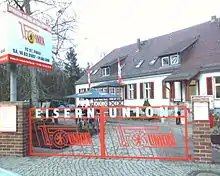
1. FC Union Berlin is led mostly by fans. Since 2004, Dirk Zingler has served as the club's president.[52] The club had 11,000 registered members in 2013.[53]
| President | From | To |
|---|---|---|
| Gerhard Kalweit | 5 June 1990 | July 1993 |
| Detlef Bracht | 17 August 1993 | July 1994 |
| Horst Kahstein | 14 November 1994 | September 1997 |
| Heiner Bertram | 7 October 1997 | 12 October 2003 |
| Jürgen Schlebrowski | 13 October 2003 | 30 June 2004 |
| Dirk Zingler | 1 July 2004 |
Sponsorships
1. FC Union Berlin is sponsored by around 300 private and corporate partners.
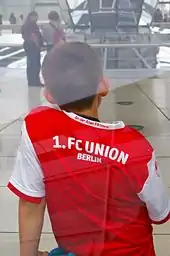
| Period | Kit manufacturer | Shirt sponsor |
|---|---|---|
| 2005/06 | Nike | EastWest |
| 2006/07 | ||
| 2007/08 | Silicon Sensor | |
| 2008/09 | do you football | |
| 2009/10 | kfzteile24 | |
| 2010/11 | ||
| 2011/12 | Uhlsport | |
| 2012/13 | f.becker | |
| 2013/14 | ||
| 2014/15 | kfzteile24 | |
| 2015/16 | Macron | |
| 2016/17 | Layenberger | |
| 2017/18 | ||
| 2018/19 | ||
| 2019/20 | Aroundtown SA | |
| 2020/21 | Adidas | |
Organizational history
The organizational history of 1. FC Union Berlin includes several different clubs and names.
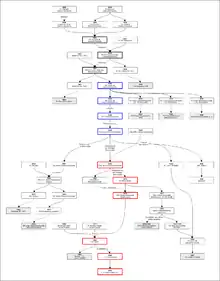
| Date | Name | Note |
|---|---|---|
| 17 June 1906 | FC Olympia Oberschöneweide | Founding of FC Olympia Oberschöneweide. |
| 22 July 1906 | BTuFC Helgoland, department Oberschöneweide | Joined club BTuFC Helgoland as a third team and department in Oberschöneweide. |
| 10 February 1907 | BTuFC Union 1892, department Oberschöneweide | Joined club BTuFC Union 1892 as a fourth team and department in Oberschöneweide. |
| 20 February 1909 | Union Oberschöneweide | Joined the football association Verband Berliner Ballspielvereine (VBB) as Union Oberschöneweide, or more precisely SC Union Oberschöneweide. |
| 1945 | SG Oberschöneweide | SC Union Oberschöneweide was dissolved by the Allied occupation authorities and the club was refounded as SG Oberschöneweide. |
| December 1948 | SG Union Oberschöneweide | The club was re-admitted under its old club name. |
| 1951 | BSG Motor Oberschöneweide | Joined with enterprise sports community BSG Motor Oberschöneweide. The team colours are changed from the traditional blue and white to today’s characteristic red and white. |
| 1 February 1955 | SC Motor Berlin | The first team was joined with the new sports club SC Motor Berlin as a football department. |
| 6 June 1957 | TSC Oberschöneweide | SC Motor Berlin was merged with several enterprise sports communities (BSG) to form sports club TSC Oberschöneweide. |
| 18 February 1963 | TSC Berlin | Merged with other sports clubs to form TSC Berlin. |
| 20 January 1966 | 1. FC Union Berlin | The football department of TSC Berlin was separated from the sports club and reorganized into a football club. Founding of 1. FC Unon Berlin. |
Honours
Domestic
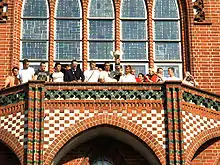
- German Champions
- Runners-up: 1923[lower-alpha 1]
- DDR-Liga Nord (II)
- Winners: 1966, 1970,
- Runners-up: 1964[lower-alpha 2]
- DDR-Liga B (II)
- Winners: 1974, 1975, 1976, 1981, 1982
- DDR-Liga A (II)
- Winners: 1985, 1991
- Runners-up: 1990
- II. DDR-Liga I (III)
- Winners: 1962[lower-alpha 3]
- 3. Liga (III)
- Winners: 2009
- DFB-Pokal
- Runners-up: 2001
- FDGB-Pokal:
- Winners: 1968
- Runners-up: 1986
- Won by SC Union Oberschöneweide.
- Won by TSC Berlin.
- Won by TSC Oberschöneweide.
Regional
- Berlin/Brandenburg Champions (−1933)
- Winners: (2) 1920,[lower-alpha 1][lower-alpha 2] 1923[lower-alpha 1][lower-alpha 3]
- Runners-up: 1917,[lower-alpha 1][lower-alpha 2] 1925[lower-alpha 1][lower-alpha 3]
- Gauliga Berlin-Brandenburg:
- Winners: 1940[lower-alpha 1]
- Oberliga Berlin (1945–63):
- Winners: 1948[lower-alpha 4]
- Runners-up: 1950[lower-alpha 4]
- NOFV-Oberliga Mitte (III)
- Regionalliga Nordost (III)
- Regionalliga Nord (III)
- Winners: 2001
- NOFV-Oberliga Nord (IV)
- Winner: 2006
- Berlin Cup (Tiers III-VII)
- Winners: 1947,[lower-alpha 4] 1948,[lower-alpha 4] 1994, 2007, 2009
- Runners-up: 1926,[lower-alpha 1] 1997
- Won by SC Union Oberschöneweide.
- VBB-Verbandsliga, organized by football association Verband Brandenburgischer Ballspielvereine (VBB).
- VBB-Oberliga, organized by football association Verband Brandenburgischer Ballspielvereine (VBB).
- Won by SG Oberschöneweide.
European
Youth
- East German Youth Championship (de)[lower-alpha 1]
- Runners-up: 1985, 1988
- East German Junior Cup (Junge Welt-Pokal) (de)[lower-alpha 2]
- Winners: 1960[lower-alpha 3]
- Corresponds to U17 level.
- Corresponds to U19 level.
- Won by TSC Oberschöneweide.
Seasons

Further reading
- Böttcher, Jan; Willmann, Frank. (2017). Alles auf Rot: Der 1. FC Union Berlin (in German), Berlin: Blumenbar. ISBN 978-3-351-05046-7.
- Koch, Matthias. (2013). »Immer weiter - ganz nach vorn«: Die Geschichte des 1. FC Union Berlin (in German). Göttingen: Die Werkstatt. ISBN 978-3730700495.
- Luther, Jörn; Willmann, Frank. (2000). Und niemals vergessen - Eisern Union! (in German). Berlin: BasisDruck. ISBN 978-3861631262.
References
- Ames, Nick (17 August 2019). "'Things are quite special here': Union Berlin prepare for the Bundesliga". The Guardian. ISSN 0261-3077. Retrieved 18 August 2019.
- STADIUM AT THE OLD FORESTER’S HOUSE. Retrieved 5 March 2016.
- Stadion An der Alten Försterei, Football Tripper. Retrieved 5 March 2016.
- Bundesliga and beyond – Union Berlin. Retrieved 5 March 2016.
- 'Iron Union!': East Berlin’s Favourite Football Team, Beyond The Last Man, 18 April 2018
- Ein Spiel für Verein und Flüchtlinge (in German) Berliner Zeitung, published: 4 January 2015 Retrieved 18 November 2015
- SC Union 06: Die Erben der Schlosserjungs (in German) Der Tagesspiegel, published: 25 June 2012. Retrieved 18 November 2015
- Kannowski, Stephan (1999). Der Einfluss der SED auf den Sport der DDR am Beispiel des Fußballvereins 1. FC Union Berlin (October 1999 ed.). Hamburg: Diplomarbeiten Agentur diplom.de (Bedey Media GmbH). pp. 44–45. ISBN 978-3832419226.
- Dost, Robert (31 August 2010). "Der zivile Club - Die gesellschaftliche Stellung des 1.FC Union Berlin und seiner Anhänger in der DDR" (PDF) (in German). Berlin: Hochschule Mittweida: 39. Retrieved 7 September 2020. Cite journal requires
|journal=(help) - "Und niemals den Ursprung vergessen: Eisern Union". Die Welt (in German). Berlin: WeltN24 GmbH. 26 May 2001. Retrieved 22 November 2020.
- "Union Berlin secure first-ever Bundesliga promotion". DW. 27 May 2019.
- "1. FC Union Berlin sign defender Neven Subotic". 1. FC Union Berlin. 4 July 2019. Retrieved 8 August 2019.
- "Union Berlin sign Anthony Ujah from Mainz". 1. FC Union Berlin. 20 June 2019. Retrieved 8 August 2019.
- "Christian Gentner becomes latest Union addition". 1. FC Union Berlin. 5 July 2019. Retrieved 8 August 2019.
- "Friedrich completes transfer from Augsburg". 1. FC Union Berlin. 5 July 2019. Retrieved 8 August 2019.
- "Sebastian Andersson the hero as Union Berlin record first ever Bundesliga point in Augsburg". Bundesliga. 24 August 2019.
- "Union 3–1 Borussia Dortmund: Union stun Dortmund for first Bunesliga win". BBC. 22 September 2019.
- The Twelfth Man. Retrieved 5 March 2016.
- "A Tiny Berlin Soccer Stadium Is The Best Place in the World To Watch The World Cup". Business Insider. Retrieved 5 March 2016.
- "The secret police with its own football team". BBC. Retrieved 5 March 2016.
- THE STADIUM BUSINESS AWARDS 2015. Retrieved 5 March 2016.
- "Profis Saison 2016/17" (in German). 1. FC Union Berlin. Retrieved 6 July 2019.
- { cite web | url = https://www.fc-union-berlin.de/en/union-live/latest-news/club/Karim-Benyamina-Union-s-record-goalscorer-126u/
- Das deutsche Fußball-Archiv (in German) Historical German domestic league tables. Retrieved 5 March 2016.
- 1. FC Union Berlin II at Fussball.de (in German) Tables and results of all German football leagues. Retrieved 5 March 2016.
- "We were smiled at back then". die Tageszeitung. 16 June 2019. Retrieved 3 March 2020.
- Union Berlin fans celebrate club's 50th birthday in style, ESPN. Retrieved 5 March 2016.
- Six Clubs You Have To Visit Before You Die, Copa90 Channel. Retrieved 8 March 2016.
- Sausages and Caviar Football Magazine – 1.FC Union Berlin, Sausage and Caviar. Retrieved 24 March 2016.
- 7 Things You Need To Know About Union Berlin. Retrieved 5 March 2016.
- "I’ve given my blood for Union". Retrieved 5 March 2016.
- The Fans Who Literally Built Their Club – Union Berlin, Copa90 Channel. Retrieved 24 March 2016.
- K. Farin/H. Hauswald: Die dritte Halbzeit, 1993,pp. 5–14.
- "The story of FC Union Berlin, the cult club you all wish you supported". Planet Football. 14 September 2017. Retrieved 8 August 2019.
- Glaser, Joakim (2015). Fotboll från Mielke till Merkel – Kontinuitet, brott och förändring i supporterkultur i östra Tyskland [Football from Mielke to Merkel] (in Swedish) (1st ed.). Malmö: Arx Förlag AB. pp. 167–168. ISBN 978-91-87043-61-1.
- Grimm, Christian (8 November 2014). ""Wir waren keine Revolutionäre" – die Wende und der Ostfußball". Wall Street Journal (in German). New York City: Dow Jones & Company, Inc. Retrieved 22 November 2020.
- Leue, Gunnar (22 January 2015). ""Was macht die Staatsmacht jetzt?"". 11 Freunde (in German). Berlin: 11FREUNDE Verlag GmbH & Co. KG. Retrieved 22 November 2020.
- "A Tale of One City: Berlin". These Football Times. 20 February 2018. Retrieved 8 August 2019.
- "Union Berlin fans celebrate goalkeeper for stopping ultras". The Washington Post. 4 November 2019. Retrieved 7 November 2019.
- "Union Berlin gegen Hansa Rostock Ost-Derby in der 2. Bundesliga". Der Spiegel (in German). 21 August 2009.
- "Dynamo Dresden host former GDR rivals Union Berlin". Fussballstadt. 5 April 2019. Retrieved 8 August 2019.
- "Union Berlin fans savouring Bundesliga promotion bid". Associated Press. 13 May 2019. Retrieved 8 August 2019.
- "RB Leipzig met with 15 minutes' silence from 20,000 Union Berlin fans". The Guardian. 22 September 2014. Retrieved 8 August 2019.
- "Bundesliga club Union Berlin: Between idealism and reality". Deutsche Welle. 16 August 2019. Retrieved 18 August 2019.
- Eisern Union Chords by Nina Hagen, Ultimate Guitar. Retrieved 5 March 2016.
- 1.FC Union Berlin: Our love, our team, our pride, our club. Retrieved 5 March 2016.
- FC Union Berlin: a remarkable club with their very own Christmas tradition. Retrieved 5 March 2016.
- Watch 27,000 Union Berlin football fans gather in stadium to sing Christmas carols, Mirror. Retrieved 24 March 2016.
- Union Berlin Training. Retrieved 16 March 2016.
- Ritter Keule Steckbrief. Retrieved 16 March 2016.
- Union fürs Leben. Retrieved 16 March 2016.
- Dirk Zingler. Retrieved 5 March 2016.
- 11 Freunde cover story translation: FC Union Berlin – An example for all to follow?, Union in English. Retrieved 5 March 2016.
External links
| Wikimedia Commons has media related to 1. FC Union Berlin. |